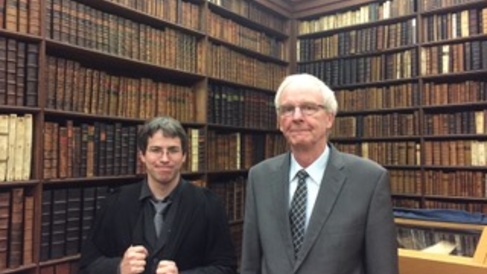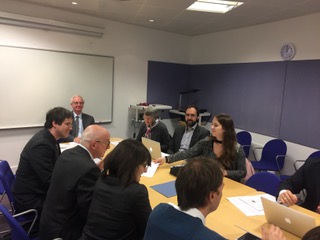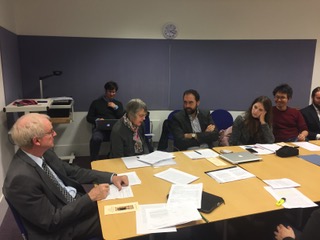
Colloquium Adamantianum I
Divine and Human Freedom: The Philosophical Significance of the Church Father Origen (Theo Kobusch)
Each of the biannual Colloquia Adamantiana, organized by the Cambridge Centre for the Study of Platonism, revolves around the research of one pre-eminent Origen scholar who responds to queries raised in papers on his major publications. The first Colloquium was devoted to the work of Professor Theo Kobusch (Bonn), whose interpretation of Origen as a metaphysician of divine and human freedom and subjectivity is among the most seminal and significant present-day contributions to the field of Christian Platonism.
As Professor Douglas Hedley (Cambridge) detailed, Kobusch’s early article “Philosophical Significance of the Church Father” of 1985 and his later magisterial monograph Christian Philosophy of 2006 were instrumental in establishing Origen’s fame as a first major Christian metaphysician on a par with the medieval Platonist Meister Eckhart or the early modern idealist G.F.W. Hegel. Isidoros Katsos (Cambridge) challenged Kobusch’s view of the prologue to Origen’s Commentary on the Song of Songs as a first theory of scientific theology with the books of the Old Testament sage Solomon corresponding to ethics, physics and metaphysics, emphasizing the text’s preoccupation with biblical hermeneutics instead. The papers of Ilaria Scarponi (Reading) and Daniel Tolan (Cambridge) focused upon the pivot of Kobusch’s reading of Origen, the Church Father’s notions of free will and the hegemonikon. In contradistinction both to Greek and Gnostic thought, Origen’s is a metaphysics that posits freedom, rather than being, subjectivity, rather than objective substance as the fundamental principle of human existence. However, while free will is indeed important for Origen’s Christian metaphysics, his emphasis on true freedom as well as his deficient account of human subjectivity and its aporetic relation to the Logos in man are not addressed sufficiently in Kobusch’s account. The two papers by Christian Hengstermann (Münster) andPui Ip Him (Cambridge) dealt with Kobusch’s interpretation of Origen’s theology, proposing a doctrine of divine bipolarity to account for Origen’s view of God as both immutable substance and passable freedom and emphasizing divine incorporeality as an ontological datum as important to the Alexandrian’s theology of the Trinity as divine freedom itself. A third panel was about the significance of Kobusch’s reading of the 3rd century Church Father to the Cambridge Origenists in the 17th with Marilyn Lewis (Bristol) highlighting the social dimension of the soul’s afterlife in Henry Hallwell’s Origenist treatises and Karen Felter (Münster) stressing the boundless ontological mobility of rational substance in Anne Conway as a distinctly Origenist tenet. The final panel, consisting of papers by Christian Pelz (Bochum) and Thomas Hanke (Frankfurt), addressed the remarkable elective affinities linking the idealist philosophies of Immanuel Kant and Georg W.F. Hegel to Origen’s Christian metaphysics of freedom. While the former was shown to share Origen’s commitment to the primacy of good will, the latter agrees with the Alexandrian philosopher in regarding personal moral choice, rather than arbitrary libertarian free will as the essence of human freedom.
 The first Colloquium Adamantianum addressed key issues of the living tradition of Christian Platonism, notably the relationship between biblical faith and philosophical reason and the significance of freedom and agency in a Christian ontology of divine and human substance. In controversial discussions, Theo Kobusch’s Origen, the author of Christian philosophy, emerged as a forebear of a rational Christian theism of divine goodness and human subjectivity. The Cambridge Centre for the Study of Platonism is grateful to Professor Kobusch for a great first Colloquium!
The first Colloquium Adamantianum addressed key issues of the living tradition of Christian Platonism, notably the relationship between biblical faith and philosophical reason and the significance of freedom and agency in a Christian ontology of divine and human substance. In controversial discussions, Theo Kobusch’s Origen, the author of Christian philosophy, emerged as a forebear of a rational Christian theism of divine goodness and human subjectivity. The Cambridge Centre for the Study of Platonism is grateful to Professor Kobusch for a great first Colloquium!
The second Colloquium Adamantianum on 2nd June 2018 will be about Anders-Christian Jacobsen’s Christ – Teacher of Salvation.
